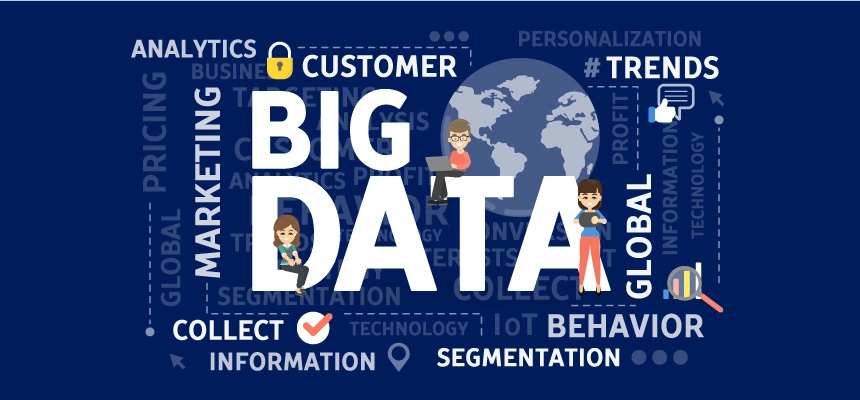Data has taken on a crucial role in today’s digital age, affecting many aspects of our life. Big data’s exponential expansion has transformed business settings and decision-making procedures, leading to a paradigm shift in how organisations function and formulate strategies. Leveraging big data analytics empowers organisations to extract invaluable insights, detect meaningful patterns, and make well-informed choices. This article will delve into ten remarkable ways through which big data is reshaping the realm of business decision-making. These transformations encompass understanding consumer behaviour on a granular level, facilitating personalised marketing campaigns that resonate with individuals, and unlocking new avenues for growth through data-driven strategies. The potential of big data to optimise operations and uncover hidden opportunities continues to shape the future of businesses worldwide.
-
Understanding Consumer Behavior through Big Data.
Understanding consumer behaviour is crucial for businesses to tailor their strategies and offerings effectively. Big data capture and analyses vast consumer data, examining purchase patterns, online behaviour, social media interactions, and demographics. This provides valuable insights into consumer preferences, needs, and motivations, enabling data-driven decision-making. By delivering targeted products and services, businesses enhance customer satisfaction and loyalty. In today’s competitive landscape, harnessing the power of big data empowers companies to stay ahead by adapting their offerings to match evolving consumer demands.
-
The Role of Big Data in Predictive Analytics.
Predictive analytics relies on historical data and statistical algorithms to forecast future outcomes. Big data serves as the cornerstone of predictive analytics, offering a diverse and intricate dataset. Machine learning algorithms enable businesses to uncover trends, patterns, and correlations in data, making accurate predictions about customer behaviour, market trends, and operational performance. This proactive response to emerging opportunities and challenges improves decision-making and provides a competitive edge. The synergy of predictive analytics and big data empowers businesses to stay ahead and make well-informed choices that drive success.
-
Big Data for Risk Assessment and Management.
Risk assessment and management are critical components of business operations. Big data enables organisations to identify, assess, and mitigate potential risks more effectively. By analysing vast amounts of structured and unstructured data, businesses can uncover hidden patterns and anomalies that indicate potential risks, such as fraud, cybersecurity threats, or supply chain disruptions. This enables proactive risk mitigation strategies, reducing the likelihood of negative outcomes and enhancing overall business resilience.
-
Enhancing Decision-Making through Real-Time Data Analysis.
Decision-making has been transformed by big data technologies that allow for real-time data access. Today’s businesses are able to quickly gather, process, and analyse data streams, giving decision-makers the most recent information on market trends, consumer behaviour, and operational efficiency. As a result, organisations are better equipped to make swift, data-driven choices, adapt to changes quickly, and acquire a competitive edge in today’s dynamic market climate. Real-time data analysis enhances agility and proactive decision-making aligned with market realities. It enables organisations to optimise plans, seize opportunities, mitigate risks, and foster sustainable growth in today’s fast-paced, data-rich environment, empowering them to stay ahead of the competition.
-
Improving Operational Efficiency with Big Data.
Big data analytics identifies inefficiencies and bottlenecks in corporate operations, streamlining processes through data analysis, enhancing productivity, reducing costs, and improving customer satisfaction by leveraging production systems, supply chains, and consumer feedback. Big data analytics also provides predictive maintenance, which enables firms to take preventative measures against equipment breakdowns or maintenance requirements. This reduces downtime, increases operational effectiveness, and supports continuous production. Organisations may promote operational excellence and keep a competitive edge in today’s fast-paced business environment by utilising the potential of big data analytics.

-
Big Data Empowering Product Development.
The development of customer-centric products that meet market demands is a complex endeavour. Big data is essential for understanding customer preferences, new trends, and market inefficiencies. Businesses can use data analysis of customer input, social media sentiment, and competitive data throughout the product development lifecycle to make wise decisions. Using this strategy, businesses can discover unmet requirements, innovate, and provide goods that appeal to their target market. Businesses may reduce the risk of product failure and raise the possibility that their products will succeed in the market by using big data in the product development process.
-
Leveraging Big Data for Supply Chain Optimisation.
Big data analytics greatly enhances supply chain management, boosting efficiency and effectiveness. By integrating data from suppliers, logistics providers, and internal systems, organisations gain a holistic view of their operations. Through analysis of historical and real-time data, businesses can optimise inventory management, demand forecasting, and transportation logistics. This data-driven approach enables cost reduction, minimises stockouts, and enhances overall supply chain performance. The result is improved customer satisfaction, streamlined operations, and increased profitability.
-
Big Data for Customer Relationship Management.
Big data is essential for effective Customer Relationship Management (CRM), as it provides businesses with abundant customer data for personalised interactions, fostering strong and enduring customer relationships. By analysing customer demographics, purchase history, and behaviour patterns, organisations can segment their customer base and create targeted marketing campaigns. Big data also enables businesses to track customer sentiment through social media monitoring and sentiment analysis, allowing them to respond promptly to customer feedback and provide personalised customer experiences. This level of personalisation enhances customer satisfaction, increases loyalty, and drives repeat business.
-
Harnessing Big Data for Competitive Intelligence.
Big data analytics empowers organisations to stay ahead in a competitive landscape. Businesses can learn about market trends, rival strategies, and client preferences by analysing external data sources like social media and industry reports. With this information at hand, businesses may spot new trends, assess competitors, and decide on a winning strategy. Leveraging big data for competitive intelligence enables organisations to adapt swiftly to market dynamics and capitalise on new opportunities.
-
Big Data Enabling Data-Driven Decision Making.
Big data’s ultimate impact on business decision-making centres around cultivating a data-driven culture. Through the utilisation of data analytics tools, companies can democratise data access, empowering decision-makers across all levels. This shift towards data-driven decision-making allows organisations to move beyond subjective intuition, relying instead on objective insights derived from big data analysis. The result is more precise and informed decision-making, mitigating bias and enhancing overall business outcomes.
Conclusion
Big data has revolutionized business decision-making, providing crucial insights for success. To stay competitive, companies need modern data analytics services.
For effective data management, explore our cloud infrastructure management services. Learn more about data strategies in our data management article.
Feature image: https://www.freepik.com/free-vector/big-data-concept-illustration-idea-collecting-analyzing-information_29174378.htm

Leave A Comment